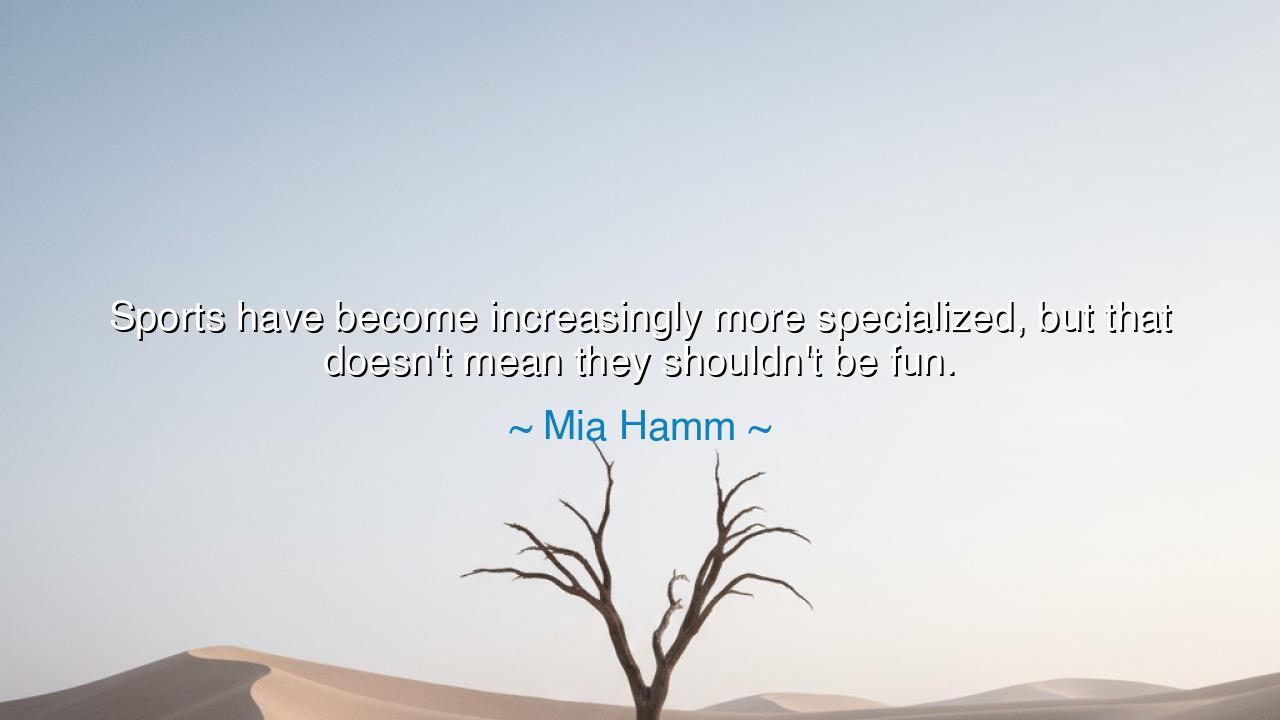
Sports have become increasingly more specialized, but that
Sports have become increasingly more specialized, but that doesn't mean they shouldn't be fun.






When the great athlete Mia Hamm declared, “Sports have become increasingly more specialized, but that doesn’t mean they shouldn’t be fun,” she spoke not only of the playing fields of her own day, but of a truth that stretches across the ages. For in her words lies a reminder to all generations: that discipline and structure, though necessary, must never extinguish the flame of joy. Without joy, the soul withers; without play, even the most skilled training becomes a burden.
The ancients themselves wrestled with this balance. The Spartans, famed for their specialized training in war, devoted their lives to the art of discipline. Yet even they allowed for the celebration of festivals, where games and contests brought laughter and unity. For what is the purpose of the sword, if not the protection of life’s lighter treasures? Hamm’s words remind us that to train the body and spirit is noble, but to lose delight in the act is to hollow out the meaning.
Consider also the tale of the young Alexander, tutored by Aristotle. Though the prince was prepared for greatness, he was not confined to one art. He learned philosophy, poetry, riding, and combat. He became skilled, yes, but his heart was also nourished by the joy of learning and the variety of human experience. If he had been bound only to the spear, his spirit might have grown rigid; instead, his curiosity shaped him into the conqueror who saw the world not only as territory, but as a canvas for knowledge and culture. Hamm’s warning is clear: specialization is powerful, but it must not devour the wider horizon of joy.
In the modern age, many young athletes are pressed early into narrow paths, taught that greatness requires endless hours of sacrifice. This can yield champions, but it can also bring exhaustion and despair. How many children abandon their sport because the laughter has been stripped from it, leaving only drills and demands? Hamm, who rose to greatness herself, knew that victory without joy is an empty crown. A field where the ball is chased with delight will yield more than a field where the ball is chased with dread.
Her words are not merely for athletes, but for all who walk the path of mastery. The painter who specializes in brushstrokes must not forget the childlike wonder that first lifted the brush. The scholar immersed in numbers must still feel the thrill of discovery. The craftsman refining his skill must also remember the play of creation. The heart must laugh, even while the hands toil. This is the secret that sustains greatness: that effort and fun are not enemies, but companions.
What then shall we, the listeners, take as our lesson? It is this: let joy be the companion of your discipline. When the weight of practice feels heavy, seek the spark that first drew you to the path. If you are a runner, run sometimes not for the clock, but for the wind upon your face. If you are a musician, play not only the scales, but the song that stirs your heart. Balance your specialization with moments of freedom, lest your spirit be bound in chains of your own making.
Practically, this means carving time for play within your craft. If you train, laugh with your companions. If you study, pause to marvel at beauty. If you labor, allow yourself to create without measure. Seek not only excellence, but joy, for in joy lies the endurance to continue. For the body may tire, but the soul sustained by delight can labor long without despair.
Thus, Mia Hamm’s words stand as a torch to future generations: sports should be fun, even in their most specialized form. And beyond sports, life itself should carry the rhythm of joy. To forget this is to walk in shadows; to remember it is to live in light. Let us, therefore, take our chosen paths with seriousness, yes, but also with laughter, with play, with the radiant fire that makes the journey worth enduring. For in joy, all discipline finds its true meaning.






AAdministratorAdministrator
Welcome, honored guests. Please leave a comment, we will respond soon